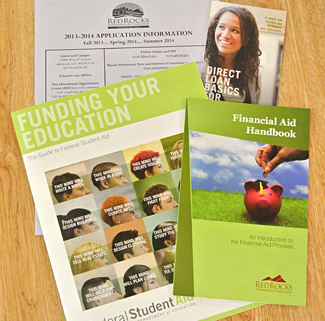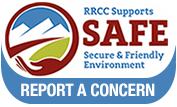Masters of Physician Assistant Studies Financial Aid
RRCC is proud to be the first community college in the country to offer a Master’s Degree, and we are pleased to be able to offer graduate level federal financial aid for the MPAS program.
Below is a chart of the estimated cost of attendance for a resident of Colorado starting the MPAS program during the 2024-2025 aid year. The Financial Aid Office determines the annual cost of attendance by adding estimated expenses for the 12-month academic year. Each student’s costs are expected to vary depending on individual circumstances. However, colleges create a generic cost of attendance based on actual tuition and fees charges combined with guidance from the State of Colorado. The total cost of attendance amounts reflect the maximum amount of loan, scholarship, and grant aid a student can receive. Updates to costs are typically determined in late spring or early summer for the upcoming academic year. See frequently asked questions (FAQs) below.
Estimated 2024-2025 Cost of Attendance
|
1st Year |
2nd Year |
3rd - Fall |
||||||||||||||||||||||||||||||||||||||||||||||||||||||||||||||||||||||||||||||||||||||
|
Colorado Resident |
||||||||||||||||||||||||||||||||||||||||||||||||||||||||||||||||||||||||||||||||||||||||
|
Tuition and Fees |
$44,223 |
$21,464 |
$5,426 |
|||||||||||||||||||||||||||||||||||||||||||||||||||||||||||||||||||||||||||||||||||||
|
Books & Supplies |
$3,660 |
$2,190 |
$730 |
|||||||||||||||||||||||||||||||||||||||||||||||||||||||||||||||||||||||||||||||||||||
|
Room and Board |
$22,380 |
$22,380 |
$8,393 |
|||||||||||||||||||||||||||||||||||||||||||||||||||||||||||||||||||||||||||||||||||||
|
Transportation |
$2,064 |
$2,627 |
$774 |
|||||||||||||||||||||||||||||||||||||||||||||||||||||||||||||||||||||||||||||||||||||
|
Personal/Medical |
$6,528 |
$6,528 |
$2,448 |
|||||||||||||||||||||||||||||||||||||||||||||||||||||||||||||||||||||||||||||||||||||
|
Loan fees |
|
$1,845 |
|
$1,845 |
|
$615 |
||||||||||||||||||||||||||||||||||||||||||||||||||||||||||||||||||||||||||||||||||
|
Physician Assistant National Certifying |
$550 | |||||||||||||||||||||||||||||||||||||||||||||||||||||||||||||||||||||||||||||||||||||||
|
Total Cost of Attendance |
$80,700 |
$57,034 |
$18,936 |
|||||||||||||||||||||||||||||||||||||||||||||||||||||||||||||||||||||||||||||||||||||
|
|
|
|||||||||||||||||||||||||||||||||||||||||||||||||||||||||||||||||||||||||||||||||||||||
Important Considerations The above sample cost of attendance represents the maximum allowable amount of all funding a student may receive, including scholarships, grants, and loans. Possible additions can be made for childcare expenses and the one-time purchase or lease of a computer. Contact the RRCC Financial Aid Office if these expenses apply to you.
When borrowing loans, we recommend that you consider the Federal Direct Unsubsidized Loan first before the Federal Graduate PLUS or alternative/private loans, since it offers a lower origination fee and interest rate, flexible repayment options, and does not require a credit check. The Federal Graduate PLUS and/or alternative/private loans require a credit check and may require a co-signor. The Federal Graduate PLUS Loan has a higher origination fee and both the Federal Graduate PLUS and alternative/private loans generally have higher interest rates.
*** The Federal Graduate PLUS or alternative/private loans may be requested in amounts up to your total cost of attendance after grants, scholarships, and the Federal Direct Graduate Unsubsidized loan have been applied.
The RRCC MPAS program spans 7 semesters over 2.5 academic years. To apply for financial aid, you will need to submit the FAFSA three times (once each year). When you meet the FAFSA priority date of April 15 and submit all required paperwork, you can expect your aid to be offered by the summer before your program begins (after the final determination of tuition rates and course fees, which are set annually in spring for the upcoming academic year, by the State Board for Community Colleges and Occupational Education). For this reason, the tuition rates and course fees listed above are subject to change.
Disbursement of financial aid funds into student accounts occurs approximately 3 weeks after the start of each semester. This disbursement either pays the tuition and fees bill in full, or in part, depending on the amount of aid available. RRCC uses the BankMobile system to issue refunds of remaining financial aid to students. It will be close to a month after classes start before your account at the college is paid, and you receive the remaining funds. For this reason, you should plan to have other resources available at the beginning of the program to pay living expenses through September. Going forward through the program, fall financial aid funds must be budgeted to cover living expenses through February, when spring aid is paid, and spring financial aid must be budgeted to cover living expenses through June, when summer aid is paid.
MPAS Program - Frequently Asked Questions about Financial Aid
Q. I’m not sure that I qualify for financial aid, should I apply?
A. We recommend submitting the FAFSA. The Free Application for Federal Student Aid (FAFSA) is used to determine your eligibility for federal student financial aid, including Federal Direct Student Loans. Graduate students are not eligible for federal grants. However, in order to borrow the Federal Direct Unsubsidized Loan for Graduate students or the Federal Direct PLUS Loan for Graduate students, you must submit a FAFSA. In addition, the FAFSA demonstrates “financial need”, which is used to determine eligibility for the limited Colorado Graduate Grant (for CO residents) as well as some scholarships.
Q. What are the steps to apply for financial aid?
A. Complete the FAFSA at https://studentaid.gov. You will be asked to establish an FSA ID username and password. Keep your user ID and password secure and available for use in making any corrections to your FAFSA, completing federal loan processes, reapplying in subsequent years, etc. After you have submitted the application online, watch for correspondence from the RRCC Financial Aid Office, requesting any additional documentation needed to complete your file. Once your file is complete, you will likely be offered the Federal Direct Unsubsidized Student Loan for Graduate students. Included with your financial aid offer will be details on next steps to accept your offered loans and apply for others.
Q. What types of student loans might be available to me?
A. Below are the types of loans available to MPAS graduate students at this time:
Q. When should I submit the FAFSA and apply for student loans?
A. You should submit the FAFSA as early as possible AFTER acceptance into the MPAS Program. The FAFSA is available beginning October 1st, prior to the start of your program the following August. It is a good idea to have all your documentation into the Financial Aid Office early, with one exception: It is best to wait to submit Grad PLUS or alternative loan applications in late spring or early summer to avoid the expiration of your application or the credit check. Credit checks are valid for 6 months and then must be redone if expired. Alternative loan applications may expire after 90 days if the school has not certified the loan. RRCC begins to certify these loan applications during the summer prior to the start of the new academic year in August. Submitting the Grad PLUS or alternative loan applications in late spring to early summer allows plenty of time for approval and certification of the loan.
Q. Do I have to reapply for financial aid every year?
A. Yes, beginning October 1st, you may submit the FAFSA for the next academic year.
Q. I submitted my FAFSA online several weeks ago, but haven’t heard anything from RRCC. What should I do?
A. Once we electronically load your FAFSA information to our system, we start running programs to see if any additional information is needed. To view the status of your account, requested documents, and to view and accept your aid offer, log into “the Rock” student portal on the RRCC website at www.rrcc.edu. Be sure to check your RRCC student email regularly for notices or requests for documentation as well. Our target is to begin loading FAFSA records in December or January of each year. Financial aid offers will follow in late spring for the upcoming academic year.
Q. How and when will I receive my aid offer?
A. Once your file is complete and we have had time to review your information, you will receive a Notification of Offered Aid in the mail. We will also send you an email notifying you that your financial aid has been offered, including instructions on viewing the offer through “the Rock” portal. You may then accept all or a portion of the offered loan. You will be required to sign a promissory note and will need to complete Entrance Counseling (an orientation to student loans). Both of these are done online.
Q. As a PA student, is there an amount I can plan to receive in my financial aid award?
A. Graduate students may borrow up to $20,500.00 in Federal Direct Unsubsidized Student Loans each academic year. In addition, you may borrow a Graduate PLUS loan or a private/alternative loan to supplement the Federal Direct Unsubsidized loan in order to cover living expenses along with tuition, fees, books, and supplies up to the total cost of attendance as shown in the Cost of Attendance charts above.
Q. How will my aid be credited to my student account?
A. Financial aid funds are disbursed directly in to your tuition and fees account. Your tuition and fees will be paid in full, or in part, depending on the amount of financial aid you are scheduled to receive. Any excess funds will be refunded to you according to the refund option you set up through your BankMobile profile. Financial Aid funds begin to be disbursed into student accounts around the second week of September in the Fall semester, the second week of February in the Spring semester, and around mid-June in the Summer semester. Refunds are delivered approximately one week to 10 days after disbursement.
Q. How should I prioritize the various loan options that are available?
A. Federal Direct Unsubsidized Student Loans are recommended as your first choice because they are not credit-based, do not require a co-signor, and you are automatically eligible unless you are in default or have already borrowed the maximum amount allowed for a graduate student. Subsequent loan choices include the PLUS Loan for Graduate Students or alternative/private student loans. The Federal PLUS loan for Graduate students has an origination fee that is deducted from the loan amount that is paid in to your student account (currently 4.024% of amount borrowed). The interest rate is set for each academic year, is the same for all borrowers, and may be less than an alternative/private loan. Alternative/private loans may not have a fee, but the interest rate can be highly variable based on your credit history. Both Graduate PLUS and alternative loans are credit-based and may require a co-signor, but the interest rates vary, so we recommend that you shop around before you decide which is best for your needs. There are other private loans that don’t require school certification and they would be the least desirable because they have even higher interest rates.
Q. How do I choose an alternative loan program?
A. If you need additional funding beyond your own resources and Federal Direct Loans, there are numerous alternative loans available to many students. There are many ways to compare alternative loan programs. Typically, a student’s unique circumstances will determine which loan program makes the most sense. While there are no absolute ways to determine which loan programs are best, there are a few general guidelines that will help you choose the most affordable loan option. Unfortunately, in the current economy, the entire student loan market has become extremely tight and there are very few lenders who offer alternative loans. We are unable to recommend any one lender over another because the best choice might vary from student to student based on your individual circumstances.
Q. Will I have my financial aid by the time I need to pay for tuition?
A. Financial aid funds are scheduled for disbursement shortly after the drop date (census date), which is about 2 weeks after classes start. On the date of disbursement, your financial aid funds are paid into your tuition and fees account, paying all or a portion of your bill. The Business Office refunds any remaining funds to your BankMobile profile. This timeline satisfies the payment deadline requirements. If you do not have financial aid accepted in an amount to cover full tuition and fees by the census date, you will need to sign up for the payment plan through the Cashiers Office in order to avoid late fees. To cover your living expenses such as room, board, and personal expenses, you should plan to have funds saved prior to coming to school to cover those expenses for 4-6 weeks, until you receive your financial aid refund.
Q. Is the payment schedule for alternative loans the same as for federal funds?
A. Yes. We also hold alternative loan funds until the drop (census) date.
Q. What is Satisfactory Academic Progress and does it apply to me?
A. Federal and state regulations require that all student financial aid recipients maintain specific academic standards, called “satisfactory academic progress” (SAP). These standards are applied to your entire academic history at RRCC, including periods when financial aid was not received. Evaluations of academic records are based on the following three criteria: cumulative grade point average (GPA), cumulative completion rate (# of credits earned compared to # of credits attempted), and maximum time frame (maximum # of credits attempted at the school). Transfer hours are considered for the maximum time frame criteria, and this is where some PA students receive an alert that they have become Ineligible for Aid. Transfer credits (and sometimes credits taken prior to admission into the PA program) are counted in the total attempted credit hours based on this regulation and can also result in becoming Ineligible for Aid. If you receive a SAP “Warning” or “Ineligible” letter from the Financial Aid Office, please contact us immediately to discuss it. Most of the time, we merely need for you to submit an appeal explaining that you are admitted into the PA program (which we consider a 2nd major) and your appeal is approved. It is important that you heed these letters, though, so that your aid is not canceled and/or delayed.
Q. If I have additional questions, who may I contact?
A. Craig Hale, Financial Aid Advisor, is the primary contact person for your MPAS financial aid questions. Craig is located at the RRCC Arvada Campus and you can reach them at (303) 914-6027, or by email at craig.hale@rrcc.edu. You may also contact the Financial Aid Office at (303) 914-6256 or rrcc.financialaid@rrcc.edu. Please allow 2-3 business days for a response. |
||||||||||||||||||||||||||||||||||||||||||||||||||||||||||||||||||||||||||||||||||||||||
Helpful Resource links for Graduate Students:
Ultimate Online Financial Aid Guide for the Master's Student











